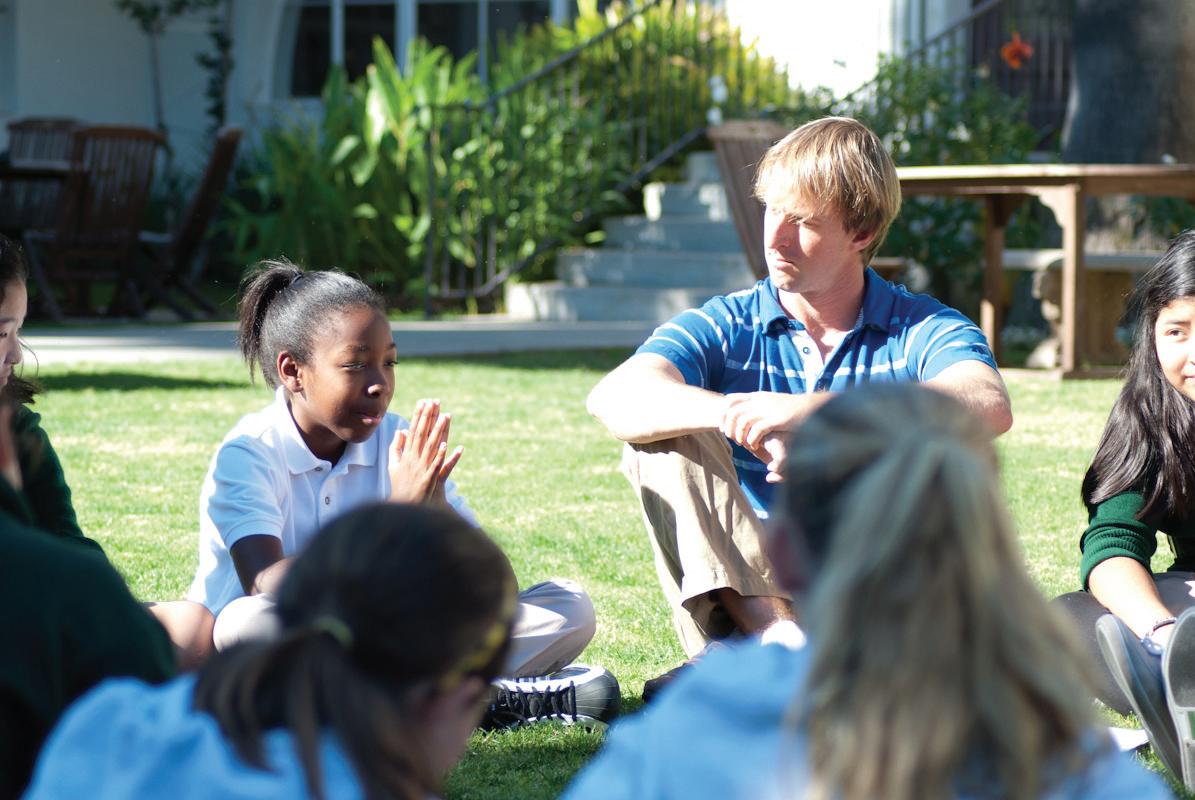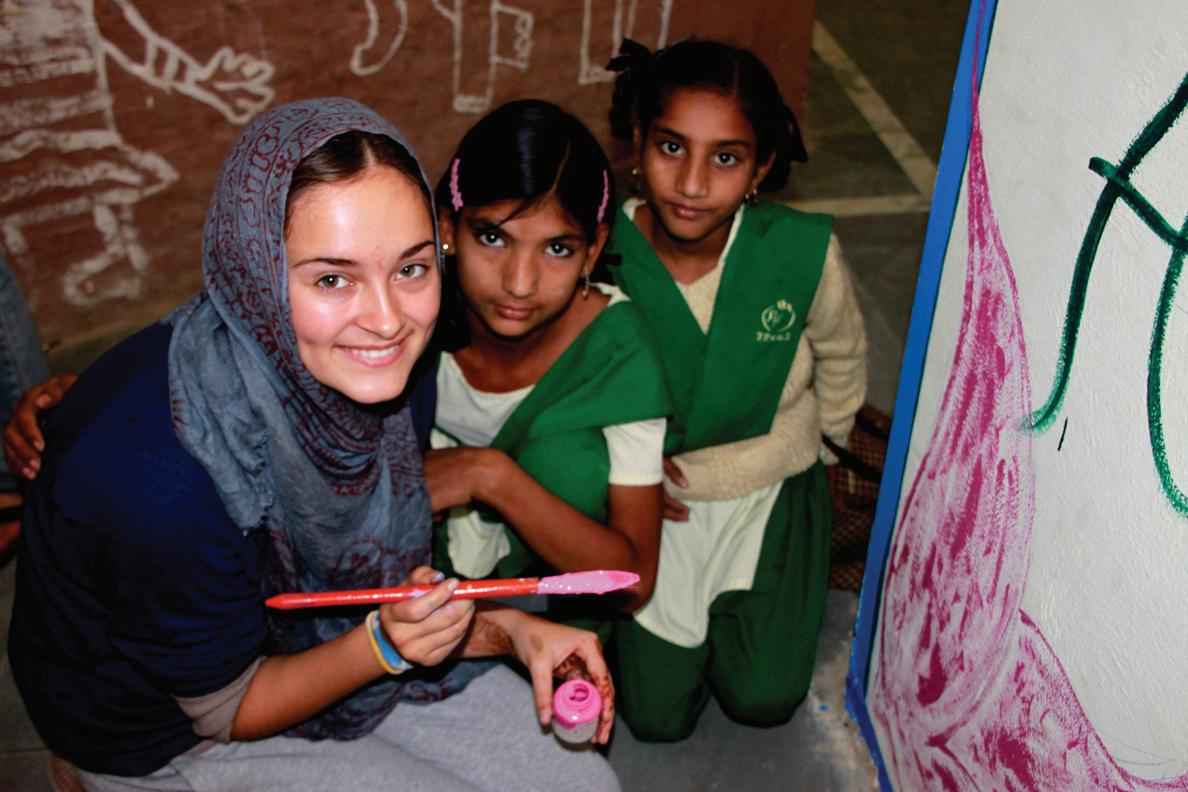
5 minute read
Diversity Day
diversity day creates community of understanding
Each year, Archer sponsors an all day on-campus conference devoted to diversity for students and faculty. This winter, the fourth annual Diversity Day program reiterated support for the School’s mission which seeks to foster critical thinking and intellectual curiosity, “strengthen girls’ voices in a diverse and culturally rich environment” and “help girls become life-long learners, strengthening their capacity to contribute positively to their communities.” In alignment with our everyday curriculum and school culture, the Diversity Day program encourages a notion of global citizenship and community, as well as raises social consciousness and cultural competency in our student body and extended community. The day’s programming was developed by Dean of Students Samantha Coyne Donnel in conjunction with the Student and Faculty Diversity Committee and parent volunteers. The program is also supported by a challenge grant from The Margaret Hall Foundation, which is committed to funding innovative programming in secondary education, and generous parent donors who assisted with matching funds. A sampling of workshops presented during Diversity Day included “Beyond Diversity Day 2011 Sessions Included: Gang Life” A Conversation about Racial Identity presented by Sometimes I Cry: The Struggle of Coping With former gang HIV and AIDS members and current employees of Los Angelesbased Homeboy Industries, the student-facilitated “No H8” (a discussion on issues facing the gay community) and The Cycle of Oppression: What it is and How it Relates to You “Sometimes I Cry” featuring a performance by Sheryl Lee Real Stories: Faces of the Gay Community Ralph (Coco Maurice ’12) of her critically acclaimed one- Have You Seen Her? Homeless Women in Santa woman show about women coping with HIV and AIDS. Monica The day closed with students and faculty sharing their personal reflections on the meaning of diversity in the Archer Korean and Japanese Pop Culture community as well as the significance of a continued dialogue Surviving the Holocaust about issues of equity and inclusion in our society. Breaking Down Microagression: How Subtle Interactions Can Create a Climate of Hostility, Fear, and Confusion
Advertisement

Growing Up in Foster Care
Body Acceptance

Kids + Money
Straightlaced: How Gender’s Got Us All Tied Up
Best Buddies and Intellectual Disabilities
educating girls globally: archer students in action

It began in 2003 with a visit from A. Lawrence Chickering, founder of Educating Girls Globally (EGG). Mr. Chickering visited The Archer School for Girls and shared with students the vision and mission of his organization--to offer girls from partner schools in India an opportunity to receive quality education in order to combat the staggering undereducation of women worldwide. Inspired by his message, Archer students formed a club to support this work and made their first trip to a partner school in India in the spring of 2004. Since then, Archer girls have continued to work within the empowerment model Mr. Chickering proposed, centered on collaborating and developing programming together, instead of merely working from a standpoint of charity. As club advisor Patty Lancaster put it, each school Archer has visited has had “something transformational happening: these girls are breaking down stereotypes about women and taking charge of their own education in order to change their future.” This past November, the 4th cohort of Archer students made the journey to India. Here is their experience, in their own words: “
The Girls Educate Girls club arrived home from an experience we will never forget. Twelve students traveled to Anupshahr, one of the least developed areas in northern India to collaborate with Pardada Pardadi Educational Society (PPES), an all-girls’ school that focuses on education and empowerment, a model very similar to Archer. It took no time at all to realize PPES was an oasis amidst the countless villages that surround it. The school was founded in hopes of ‘creating a new generation of self-reliant and educated girls who will break the cycle of poverty.’ This will result in the eventual transformation of rural society, something crucial to the process of empowering women so they can become free from the social restraints that bind them to archaic ways of life. Those who graduate from PPES will be socially and financially independent individuals, with opportunities awaiting them that would not be possible without Pardada Pardadi.
We spent our time at the school in interactive sessions with students from three years old to 18 years old, visiting (and teaching at times) their home science, English, P.E., art, embroidery, and computer classes. Our exchange with the students was a transformative experience that made the importance of receiving an education all the more clear. Throughout our stay at the school, we worked on a mural that covers three walls in the dining area. We hope our mural will remind them of how appreciative we are to have shared such an amazing experience and that they will always be in our hearts.
Additionally, we visited the homes of a few students to learn about rural life in India and the roles girls and women play in an extremely patriarchal society. Apart from our time at the school, the trip was filled with new experiences that triggered moments of profound inspiration. These included sitar concerts, boat rides down the Ganges, lots of sightseeing, rugged travel and much more that forced us to question our previous conceptions of the world and immerse ourselves in a truly beautiful new culture.
What’s next for Girls Educate Girls? Our mission of education and empowerment motivates us to share our experience with the Archer student body, inviting anyone who is inspired to join us in our work. We will make presentations to other schools in Los Angeles as well, and inform people about PPES and how they can help. The Girls Educate Girls club has begun a relationship that will last for many years, and our continued communication with PPES is imperative. We have a pen pal program for younger girls, as well as tentative plans for the next trip to India. We hope to one day bring some PPES girls to Archer, so we can share more elements of our lives with them. The value of our journey goes far beyond the two weeks we spent in India, and now that we’re back at Archer, our future goals and projects can begin to take form. - Written by Clancey Cornell and Morissa O’Mara, Class of 2011 ” 19






